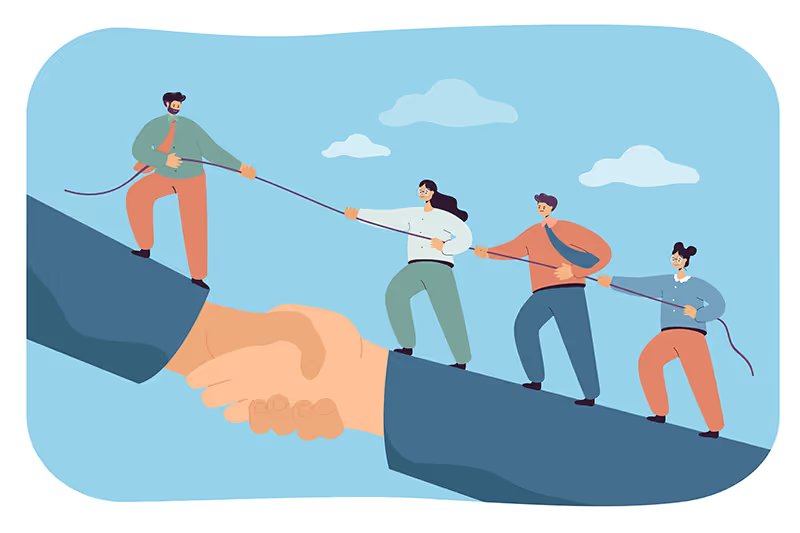Key Insights:• Accountability is essential for organizational success, but leaders have a hard time creating it.• Often organizations default towards a punitive approach, where accountability is viewed with fear, yet this disengages employees and limits performance.• When leaders take a proactive approach, accountability can lead to growth and innovation.
Casey, a product lead, was tasked with leading a team to build and quickly roll out a new product. She emailed each team member the project plan and their individual list of deliverables, signing off with a quick, “Let me know if this isn’t clear.” If all deadlines are met, they should be able to launch on time.
At first, everyone seemed excited about the project. Within a week, however, one of her team members missed a deadline. Casey reached out to see what happened, only to be given a vague excuse and a mumbled promise to catch up. Frustrated, but not wanting to call this member out or fall behind, Casey finished the deliverable herself.
A week later, the same team member missed another deadline. This time the team was visibly frustrated, seeing that there were no real repercussions, and they started to miss their own deadlines. Desperate to get back on track, Casey decided she needed to take a tougher approach, reminding the team of the pressure from leadership for the project’s success: “Missing deadlines is not an option.” When she noticed a mistake in the product design and confronted the person responsible, he blamed his assistant, who then turned the blame back around on him. Casey was at a loss, not knowing who she could count on.
Getting a team to reach their deadlines and own up to their mistakes instead of blaming others is an all-too-common challenge for managers. Often, leaders feel the only way to get accountability from their team is with punishment. However, this doesn’t always get the intended results. Instead, individuals begin to experience angst or fear, viewing accountability as synonymous with blame, control, or punishment. Cultures anchored on this type of punitive approach also tend to view learning with a fixed mindset and lack psychological safety, all of which stifle growth and innovation.
Yet, this is not the only way to approach accountability. NLI recently published a journal article, “Organizational Accountability: From Punitive to Proactive,” that describes the shift organizations can make from a punitive form of accountability — in which employees follow through on their commitments to avoid punishment, or they blame others when they don’t follow through — toward a proactive approach — in which employees take initiative to reach their commitments, viewing the process as an opportunity to innovate and grow.
Accountability is generally defined as being clear with others on future actions, following through on those actions, and taking ownership of the results, whether positive or negative. One of the biggest challenges organizations face when looking to create and sustain a culture of accountability is a misalignment between the systems it has in place and individuals’ day-to-day experience.
Misalignment between the two leads to a lack of what researchers term “felt accountability,” which is the belief that one’s actions and performance will be assessed in a predictable way. So, when managers aren’t clear about their expectations or don’t follow through on those expectations, or if leaders or other team members aren’t held to the same standards, the sense of felt accountability erodes.
When Casey let the first missed deadline pass without consequences, her team started to believe that deadlines didn’t matter. Ultimately, this misalignment led to disengagement and lack of follow through.
One approach organizations can take is similar to what Casey defaulted to: punitive accountability. This creates a culture where individuals experience accountability with fear and punishment, fostering behaviors such as blame and avoidance and stifling growth, creativity, and helpful risk-taking behaviors. Research shows that these behaviors are largely a result of limbic system engagement which becomes active in the face of perceived environmental threats, dampening cognitive performance and team collaboration.
However, there is another direction organizations can choose. We’ve termed this approach proactive accountability, which creates a culture where individuals experience accountability as an avenue for growth and development, encouraging ownership and learning from mistakes. Here, leaders are clear in their expectations, transparent in their decisions, and role model a solution-focused, growth-oriented approach toward reaching goals.
Proactive accountability drives individual and team performance and innovation, and it encourages collaboration and trust. In contrast to the punitive approach, in proactive accountability, limbic system engagement is kept to a minimum, and brain regions associated with goal-directed behavior, such as the prefrontal cortex and reward networks, are engaged.
Let’s see how Casey’s story could have been different if she had taken a proactive approach. Upon mapping out the new project plan, she schedules a meeting with her team and walks them through it, highlighting each member’s role and deliverables, including her own, and clarifying the timeline. She acknowledges that reaching the goals will be a stretch but emphasizes that when roadblocks occur, they can adjust and learn from the challenges.
After the meeting, Casey reaches out to each member individually, checking for clarity on their next steps and offering to review processes, if needed. This time, instead of a missed deadline without warning, a team member contacts Casey early in the week to share that she doesn’t understand how to begin one of her tasks, as it requires a tool she’s never used. Casey jumps on a call to give her an overview, and within a couple of days the team member reaches her deadline, excited that she now has a new skillset. When Casey notices a mistake in the design, the team member responsible for the error quickly jumps in to fix it, thanking her for the catch. When proactive accountability is the default, people move from defending to learning.
The latest NeuroLeadership Journal article marks the beginning of a journey into understanding accountability at the organizational level and the essential behaviors needed to create this culture. It also represents one of the three primary interrelated elements of modern leadership: growth mindset, psychological safety, and accountability. Leaders who build habits around these three elements create a team culture where high performance is expected, rewarded, and recognized as a work in progress. To read the full article, “Organizational Accountability: From Punitive to Proactive,” click here to become an NLI Corporate Member.




.avif)



